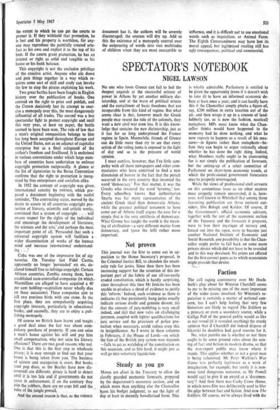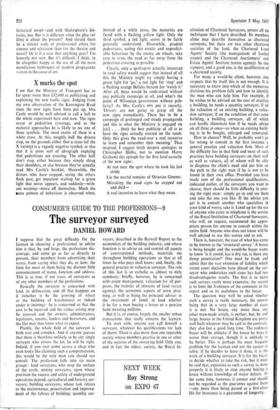NIGEL LAWSON
SPECTATOR'S NOTEBOOK
No one who loves Greece can fail to feel the deepest anguish at the successful seizure of power in Athens by yet another military dic- tatorship, and at the wave of political arrests and the curtailment of basic freedoms that are inseparable from this kind of regime. But what seems clear is that, however much the Greek people may resent the rule of the colonels, they want a new civil war even less. It is this know- ledge that sustains the new dictatorship, just as it has for so long underpinned the Franco regime in Spain. Meanwhile, friends of Greece can do little more than try to see that every action of the ruling junta is exposed to the light of day and so to the pressure of world opinion.
I must confess, however, that I've little sym- pathy with all those newspapers and other com- mentators who have contrived to find a new dimension of horror in the fact that the putsch occurred in the very country that invented the word 'democracy.' For that matter, it was the Greeks who invented the word 'tyranny,' too. Every schoolboy knows that authoritarian Sparta was far more representative of the ancient Greek ideal than democratic Athens; while the greatest political testament to have come out of Athens itself argues the case for a utopia that is the very antithesis of democracy. What Greece has taught the world is the mean- ing of civilisation—a very different matter from democracy, and (pace the left) rather more important
Not proven
This journal was the first to come out in op- position to the Home Secretary's proposal, in the Criminal Justice Bill, to abandon the unani- mity rule for juries. Since then there has been increasing support for the retention of this im- portant part of the fabric of our all-too-easily eroded constitution, which is hardly surprising, since throughout this time Mr Jenkins has been unable to produce a shred of evidence to justify this 'reform.' Indeed, such evidence as there is indicates (i) that persistently hung juries usually indicate serious doubt and genuine dissent, (ii) that the amount of jury-nobbling is very small indeed, and (iii) that new rules on challenging jurymen, coupled with tighter qualifications for jury service and the provision of police pro- tection when necessary, could reduce even this to insignificance. As I wrote in these columns in February, if the House of Lords—on which the fate of the British jury system now depends —fails to act as watchdog of the constitution on this occasion, and to bite hard, it might just as well go into voluntary liquidation.
Steady as you go
Moves are afoot in the Treasury to allow the closely guarded economic forecasts, prepared by the department's economic section, and on which more than anything else the Chancellor bases his budget judgment, to see the light of day at least in decently bowdlerised form. This
is wholly admirable. Parliament is entitled to be given the opportunity (even if it doesn't wish to take it) to have an informed economic de- bate at least once a year; and it can hardly have this if the Chancellor simply plucks a figure of, say, £200 million in extra taxation out of the
air, and then wraps it up in a cocoon of land- lubberly (or, as is now the fashion, nautical) metaphors. MPs must know what the Chan- cellor thinks would have happened to the economy had he done nothing, and what he now expects to happen as a result of his mea-
sures—in figures rather than metaphors—be- fore they can begin to argue rationally about whether be has done the right thing. Indeed, what Members really ought to be clamouring for is not simply the publication of forecasts, but the setting-up of a select committee of Parliament on short-term economic trends, at which the professional government forecasters may be properly interrogated.
While the views of professional civil servants on this contentious issue as on other matters must properly remain unrevealed, it is, how- ever, well known in Whitehall that among those favouring publication are those eminent out- siders, Drs Balogh and Kaldor. Of course, if the Government's official economic advisers, together with the rest of the economic section of the Treasury and the forecasts it prepares, were to lose their mystique of secrecy and, forced out into the open, were to become just another National Institute of Economic and Social Research, one possibility is that the Chan- tellor might prefer to fall back on some more private device which did not have to be revealed and in this way devalued. No prizes are offered for the first correct guess as to which economists might provide that device.
Faction
The still raging controversy over Mr Hoch- huth's play about Sir Winston Churchill seems to me to be missing one of the most important of the wider issues involved. Sir Winston's re- putation is certainly a matter of national con- cern, but I can't help feeling that very few historians are likely to regard The Soldiers as a primary or even a secondary source, while a Gallitp Poll of the general public would as like as not reveal (if it revealed anything) the sturdy opinion that if Churchill did indeed dispose of Sikorski he doubtless had good reasons for it.
No, what puzzles me is whether or not there ought to be some ground rules about the mix- ing of fact and fiction in modern drama, so that the non-expert public may know where it stands. This applies whether or not a great man is being calumnied. Mr Peter Watkins's War Game was perfectly legitimate as a work of imagination, for example; but surely it is non- sense (and dangerous nonsense, as Mr Powell would say) to give it an award as a 'documen- tary'? And then there was Cathy Come Home. in which news film was deliberately used to blur the edge between fact and fiction. And now The Soldiers. Of course, we've always lived with the
historical novel—and with Shakespeare's his- tories, too. But is it different when the play (or .film) is about the present? And should there be a stricter code of professional ethics for cinema and television than for the theatre and novel? Or is it a case that anything goes? I'm honestly not sure. But it's difficult, I think, to be altogether happy at the use of all the most mendacious techniques of modern propaganda —even in the cause of art.
X marks the spot
I see that the Ministry of Transport has so far spent more than £32,000 in publicising and explaining the new traffic signs. Judging from my own observation of the Kensington Road since the new signs have been put up, Mrs Castle would be well advised to call a halt to the whole experiment here and now. The signs occur at pedestrian crossings, and as the motorist approaches he is likely to see one of three symbols. The most exotic of these is a white cross. At this, roughly half the drivers stop, on the grounds either that a cross (of the X variety) is a vaguely negative symbol, or else that it is some sort of ideograph implying that pedestrians are crossing. The other half don't stop, either because they simply shrug their shoulders, or else because they've actually read Mrs Castle's booklet. Meanwhile, the drivers who have stopped, seeing the others flash past, get impatient waiting for a green light that never appears, and suddenly—with- out warning—move off themselves. Much the same pattern of behaviour is observed when,
instead of a white cross, the motorists are faced with a flashing yellow light. Only the third symbol, a red light, seems to be fairly generally understood. Meanwhile, prudent pedestrians, noting this erratic and unpredict- able behaviour by the enemy on wheels, take care to cross the road as far away from the pedestrian crossing as possible.
Clearly, only a spoil-sport actually interested in road safety would suggest that instead of all this the Ministry might try simply having a green light for `go,' a red light for 'stop' and a flashing orange Belisha beacon for 'watch it.' After all, these would be understood without any publicity campaign at all, and what's the point of Wilsonian government without pub- licity? As Mrs Castle's PPS put it recently, 'Drivers are not going to grasp all the new signs immediately. There has to be a campaign of prolonged and steady propaganda and this is what the Ministry is engaged on [sic] . . . (but) the best publicity of all is to have the signs actually erected on the roads. Only this gives the road-user a real incentive to learn and remember their meaning.' Thus inspired, I suggest (with deepest apologies to Christopher Hollis, not to mention Harry Graham) this epitaph for the first fatal casualty of the new signs: '
At rest near the spot where he took his last stride Lie the mortal remains of Octavius Greene:
Mistaking the road signs he stepped out and died—
A real incentive to learn what they mean.



































 Previous page
Previous page